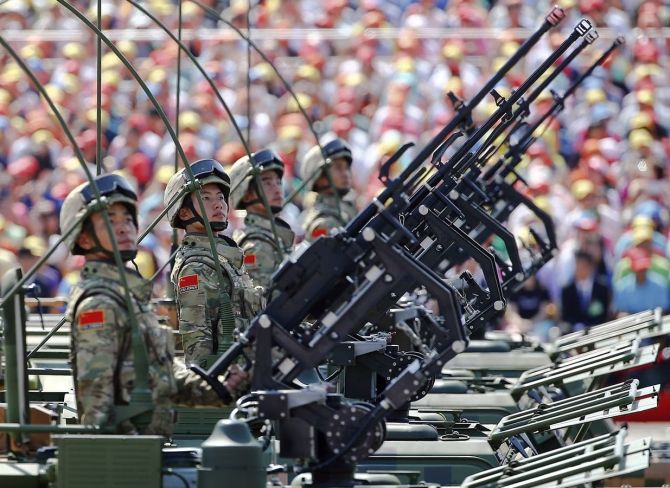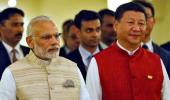'Whether it is the One Belt One Road project or building relationships in the Indian Ocean Region -- supposedly our area of concern -- the Chinese are seriously outpacing us,' points out Vice-Admiral Premvir Das (retd).

Prime Minister Narendra Modi began his tenure by inviting neighbouring country heads, among them Pakistan Prime Minister Nawaz Sharif, to his swearing-in ceremony. This was a path-breaking gesture which he hoped would lead to some forward movement in the relationship between the two countries.
Some efforts were made to resume the dialogue process such as the interface between foreign secretaries and national security advisers of the two countries.
And finally, there was Modi's spontaneous visit to Sharif's private empire at Raiwind near Lahore for a family ceremony. The Indian PM had executed a series of tactical moves that would, apparently, lead to a more congenial interface.
But look at the situation some months later: A daring raid on one of our premier forward air force bases by terrorists from across the border and an even more traumatic attack on a well-guarded military unit just on the border, which left nearly a score dead.
It was just a signal from those who matter in Pakistan that things should get back to where they were.
This was followed by our own much publicised 'surgical strike.' Whether we went in a couple of hundred yards or a few kilometres is not the issue.
The bottom line is that the incursion was widely publicised, unlike earlier such actions, signaling a more muscular stance.
Since then, the border has been 'live' with almost daily exchange of fire between the two militaries.
For ideological and religious reasons, Pakistan has always seen India as a Hindu country and inimical to its interests. This has nothing to do with Partition or with the unresolved Jammu and Kashmir question.
Even if that is out of the way, India is and always will remain the enemy.
The sense among some of our liberals that the younger generation in Pakistan will begin to see things differently is misplaced; they are even more radicalised.
In supporting cross-border terrorism, Pakistan has found a very cost-effective alternative to a full-fledged war. This allows them to keep the enemy image in focus.
For India, the choice is hugely different. Pakistan is not an enemy is our fundamental thesis; it is just a horrible thing.
Its army is hostile, its politicians are weak, it sponsors terrorist groups, etc, but it is not an enemy.
This is the paradox.
We are their adversary, but they are not ours.
Since war is, equally, not an option for us, at least until things really come to grief, our response is to manage what is being thrown at us and this is exactly what we have been doing.
Yes, issues in J&K are a problem, but they are not headaches we cannot live with.
The situation will become grave if something like the Mumbai attack of November 2008 happens to us -- although one assumes that we have plans, short of war, to respond to any such aggression which, in any event, Pakistan will have to think through very carefully.
In short, the status quo seems to be the answer with both sides being content to treat it as such.
Sporadic moves and responses seem to be dictating our strategy.
So, let us get Pakistan out of the way; it is just a tactical scenario.
What we need to focus on is the international battlefield in which another nation -- China -- should be the centre of our strategic focus.
It is already the major Asian power with an economy five times ours.
It is not a country of some 170 million, but one of 1,400 million.
Its economic relations with the world are far ahead of our own.
Its trade with the rest of the world is far in excess to our trade with the same countries.
Its foreign exchange reserves and, consequently, its ability to help others is way beyond our own capabilities.
In short, we stand nowhere in comparison with China today and will struggle to reach where it is now even three decades hence.
This fact has had its impact on the emerging security environment.
China is clearly the second most important global player after the United States.
Take the South China Sea issue -- no country of South East Asia, save Vietnam, is willing to take up against the Chinese stance.
Even the most vitally affected Philippines is prepared to dump the US for China.
Russia, too, is already supporting China's position.
Only Japan has taken a position in line with India's.
Whether it is the One Belt One Road project or building relationships in the Indian Ocean Region -- supposedly our area of concern -- the Chinese are seriously outpacing us.
One positive development that may be to our advantage is the likely easing of the US-Russia tensions in the new US administration.
A positive engagement with the US and Russia, on the one hand, and with Japan, Australia and Vietnam, on the other, along with other smaller partnerships in the IOR littoral region, are critical to cope with the situation developing around us, leave aside every effort to keep the immediate neighbours, except Pakistan, on our side.
This is easier said than done.
Witness China's moves in Bangladesh ($20 billion in aid and two submarines to boot), Nepal, Sri Lanka and Maldives.
But there are non-quantifiable synergies in these countries with India which the Chinese cannot easily match and which need to be exploited.
In the IOR, too, we have capabilities which the Chinese will find very hard to equal.
But all this can be done only if we have our focus on the overall map.
The emerging security environment is not very conducive to India's interests and the overall strategic picture, much more than the tactical one, must occupy our minds.
Vice-Admiral Premvir Das (retd) has been Commander-in-Chief of the Eastern Naval Command. He has also served on the National Security Advisory Board.
DON'T MISS the features in the RELATED LINKS below...











